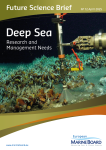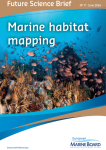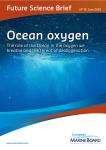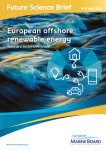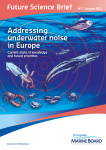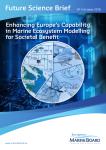Future Science Briefs
EMB Future Science Brief No. 10 highlights the most recent science on Ocean oxygen, including causes, impacts and mitigation strategies of Ocean oxygen loss, and whether “every second breath we take comes from the Ocean”. It closes with key policy, management and research recommendations to address Ocean deoxygenation and communicate more accurately about the role of the Ocean in Earth’s oxygen.
EMB Future Science Brief No. 9 provides an overview of the technology and European deployment status in the offshore renewable energy sector. It discusses the environmental and socioeconomic considerations, and presents the key knowledge, research, and capacity gaps that must be addressed to ensure sustainable delivery of the EU Green Deal. It closes with key policy, research, capacity, and data recommendations to take the sector forward.
New Ocean challenges and opportunities fuel the need for enhanced marine and solution-oriented science communication. This Future Science Brief highlights the critical need to strengthen the marine science communication capacity in Europe, as well as develop dedicated training programs, engage in deeper and wider collaboration with stakeholders, and ensure close interaction with the UN Decade of Ocean Science for Sustainable Development (2021-2030) and the EU Mission: Restore our Ocean and Waters by 2030.
EMB Future Science Brief N°7 outlines the current state of our knowledge on the sources of anthropogenic sounds and the effects of noise on marine organisms. Moreover, it provides an overview of the measures that have been taken to address the issue of underwater noise. In order to develop proportionate mitigation strategies and effective regulation, we have to advance our knowledge about the effects of anthropogenic noise on marine organisms and their ecosystems.
This Future Science Brief outlines recent advances, challenges and opportunities for big data to support marine science. To develop solutions to key societal challenges, there is an increasing need for more complex, transdisciplinary analyses across traditionally siloed disciplines and sectors. To achieve these goals, we need to move towards increased digitalization and the adoption of big data in marine science. The publication identifies overarching challenges and recommendations within the categories of data acquisition, data handling and management, service interoperability, computing infrastructures and data accessibility, data sharing, big data analytics, and training networks and collaboration. These are explored through topics and case studies on climate science and marine biogeochemistry, habitat mapping for marine conservation, marine biological observations, and pest control in the aquaculture sector.
EMB’s Future Science Brief n°5 calls for a better incorporation of the values stemming from marine ecosystem services and natural capital in marine management and policy decisions. Evaluating the impacts of human activity on ecosystem services and their social and economic consequences can highlight the trade-offs between actions to reverse the declining states of marine biodiversity and ecosystems, and possible competing economic interests. A wide array of methods and techniques for ecosystem valuation already exist, but mainstreaming, understanding and implementation of marine ecosystem valuation approaches and applications should be further developed.
This publication looks at how marine ecosystem models are being increasingly used as a tool for ecosystem management. It gives examples of current capability and examines the mis-match between science and policy, providing recommendations to strengthen marine ecosystem modelling capability for current and future societal needs.
